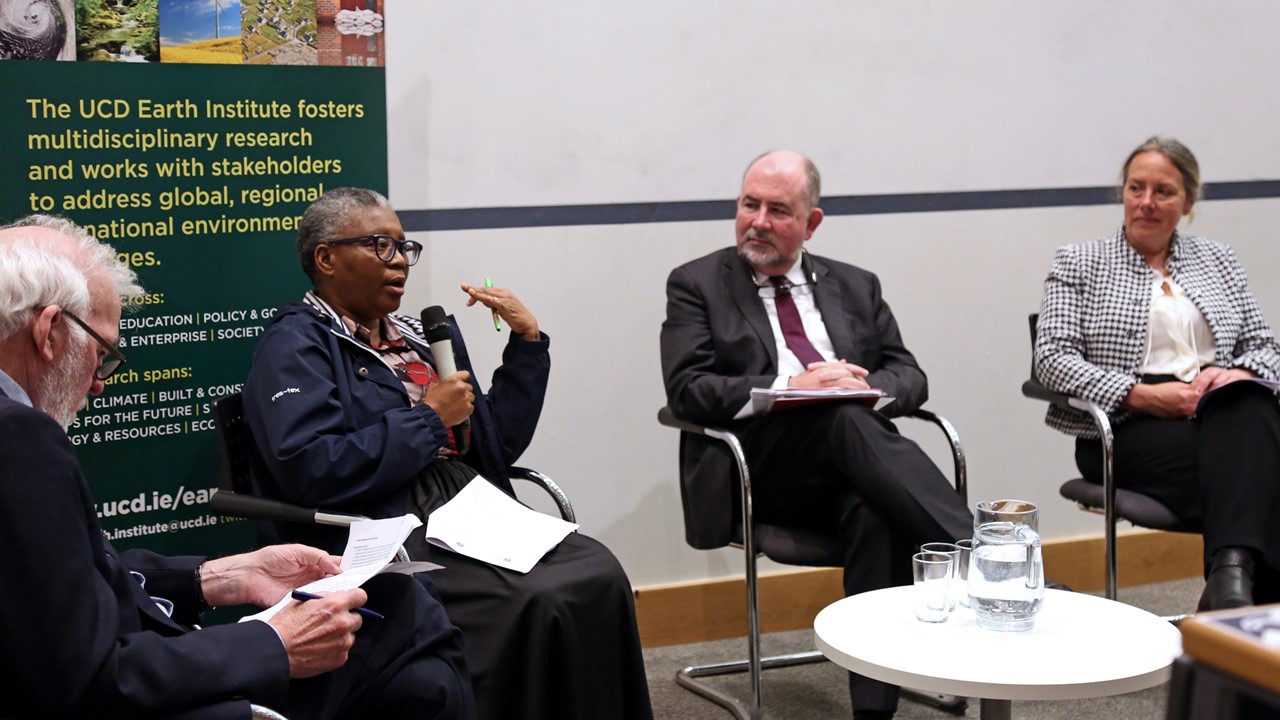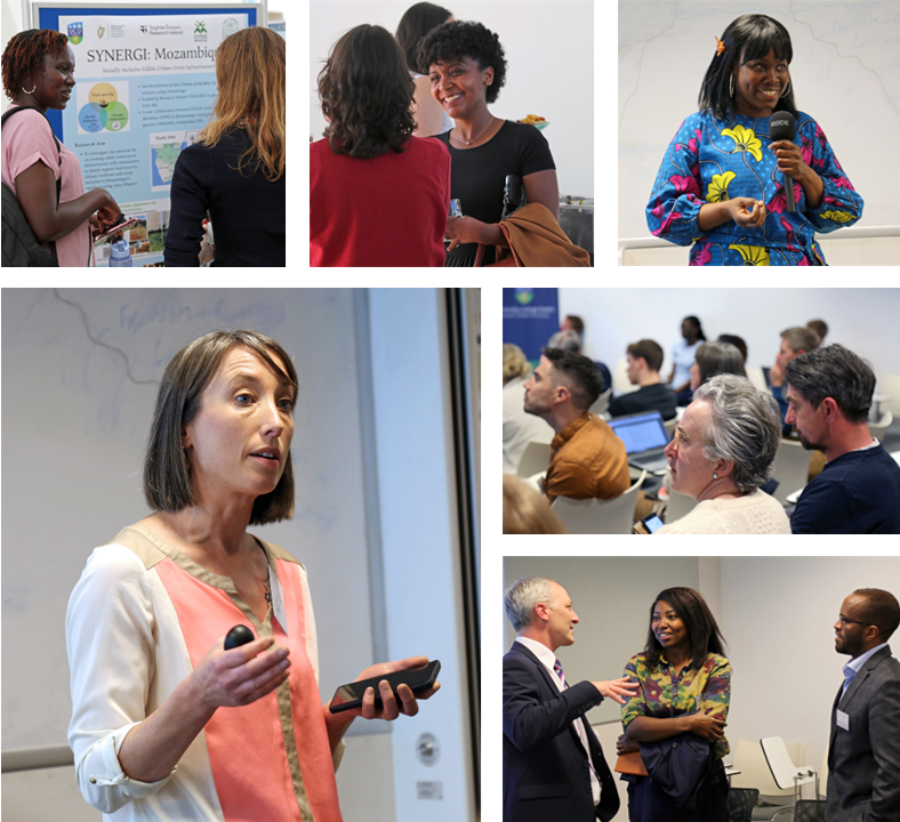Significant potential to increase partnerships with institutions and industry in Africa
Monday, 26 May, 2025
Share

UCD’s research collaboration with African partners has generated rich and impactful outcomes in recent years - but scope remains to develop even more relationships with more universities, industry and societal partners.
This was one of the key messages of a keynote panel discussion on Africa, hosted by UCD’s Earth Institute and Office of Global Engagement, on Thursday afternoon. (View full detailed programme).
The discussion was the final session of a unique three-part event entitled Africa, Ireland and UCD: Working together to address global sustainability challenges, a gathering that marked two years since the university launched its ambitious strategy to establish Africa as a priority region.
UCD has forged strong research partnerships across Africa, with 1,506 co-authored publications on topics such as climate, food security and health delivered alongside 379 African institutions in the five years to 2024. The university also has a significant cohort of visiting students: as of January of this year, 570 students from 35 African countries were studying at UCD.
However, gaps remain, particularly at industry level. Only five publications have been co-authored with African companies, the audience heard, revealing a significant level of untapped partnerships.
This keynote panel session addressed the benefits, challenges and priorities for collaborations around sustainability, climate and environment research. Moderated by Tom Arnold, Chair of the Ireland Africa Rural Development Committee (IARDC), the contributors were:
- Professor Kate Robson Brown, UCD Vice President for Research, Innovation and Impact
- Dr Aklilu Fikresilassie Kabiso, Regional Director of Cities (Africa), World Resources Institute
- Professor Pat Gibbons Director, Centre for Humanitarian Action & Academic Lead on the UCD Africa Engagement Strategy
- Kyle O’Sullivan, Director of the Africa Unit at the Irish Department of Foreign Affairs and Trade
- Dr Inês Raimundo, Associate Professor of Human Geography at Eduardo Mondlane University, Mozambique
Addressing the impetus to develop industry partnerships, Professor Robson Brown spoke of her experience of partnering with colleagues in Strathmore University, Nairobi, on translating research outcomes into economic benefits for local communities.
She explained that and her colleagues did this by creating a dedicated innovation and translation centre for the university, through knowledge exchange, and by establishing strong links with large companies that included graduate placement.
“There’s a very vibrant research community in the universities within Nairobi to show ways in which [research] might be translated into… patents or licensing agreements with companies to stimulate economic benefits in the region,” she said. “And that is something that a university like UCD, which has such profound experience through UCD Nova… to engage with that at the pace and in the direction that is needed in partnering with organisations in Africa. I’m particularly interested in how we might be able to accelerate some of that work.”
Joining the conversation from Ethiopia, Professor Gibbons acknowledged the strength of the UCD strategy and spoke of the growing engagement between Ireland and Africa. However, he called for a transition from a more individual partnership approach to a greater focus on institutional partnerships.
On the efforts to achieve this goal, he said: “We’re trying to establish truly institutional partnerships between UCD and many of the universities here… through the establishment of a partnership farm that can allow us to engage in research that can have impact - not just in Ethiopia, but in the Horn of Africa.”
He added: “We’re engaging in a series of intersectoral arrangements where we engage with Teagasc, with government, so we move from an academic partnership to an intersectoral partnership. This transition is going to be interesting and I think there’s plenty of opportunities all across the continent for the Africa strategy.”
Elsewhere, Dr Raimundo spoke of the importance of her research partnership with Dr Christine Bonnin (Assistant Professor in the School of Geography), with data sharing being a key synergy. “In sub-Saharan Africa, one of our biggest challenges is access to data because in many cases, our leaders consider any kind of data to be highly classified,” she explained.
Discussing the challenges being faced by communities in Africa, Dr Fikresilassie Kabiso highlighted a fragmented approach and a “disconnect in terms of action” in the context of addressing climate-related issues. He called for more data and research-driven action, as well as sustainable financial independence.
Mr O’Sullivan, meanwhile, revealed that the Government’s approach is to enable Africa itself to create the development and stability it needs. While the international community, including Ireland, can assist through overseas development assistance, or ODA, “the heavy lifting will be done by people on the continent”, Mr O’Sullivan said.

Earlier, the first session of the half-day event featured contributions from 16 UCD researchers who have worked in Africa on a wide range of collaborative projects on areas such as environment, food security and health. It was co-chaired by Dr Tensay Meles, who has researched energy and environmental economics in Ethiopia, and Dr Diretnan Dikwal-Bot, who previously worked on digital media cultures in countries including Nigeria.
Moderated by Dr Caitriona Dowd of UCD’s School of Politics & International Relations, the second session focused on researcher and community perspectives on Research Ireland and Irish Aid funding for collaborative, transdisciplinary projects, including (opens in a new window)SDG Challenge and (opens in a new window)COALESCE (Collaborative Alliances for Societal Challenges) calls. In addition, the audience heard about the WECOAdapt and SANKOFA projects, both of which focus on important sustainability challenges.